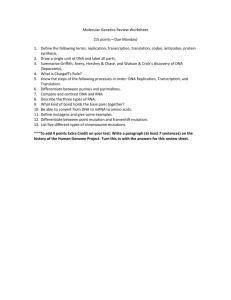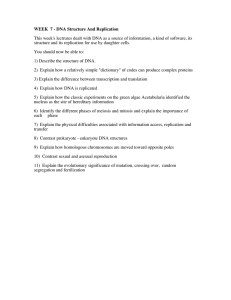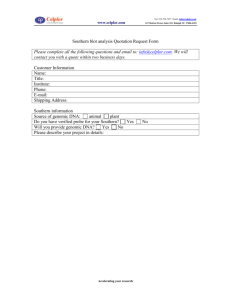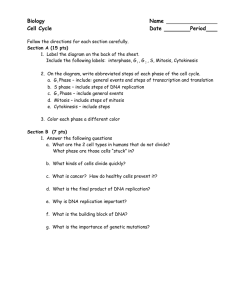BIOCHEMISTRY PREVIOUS SPEAKERS ACADEMIC YEAR 2013-2014 SPEAKER
advertisement
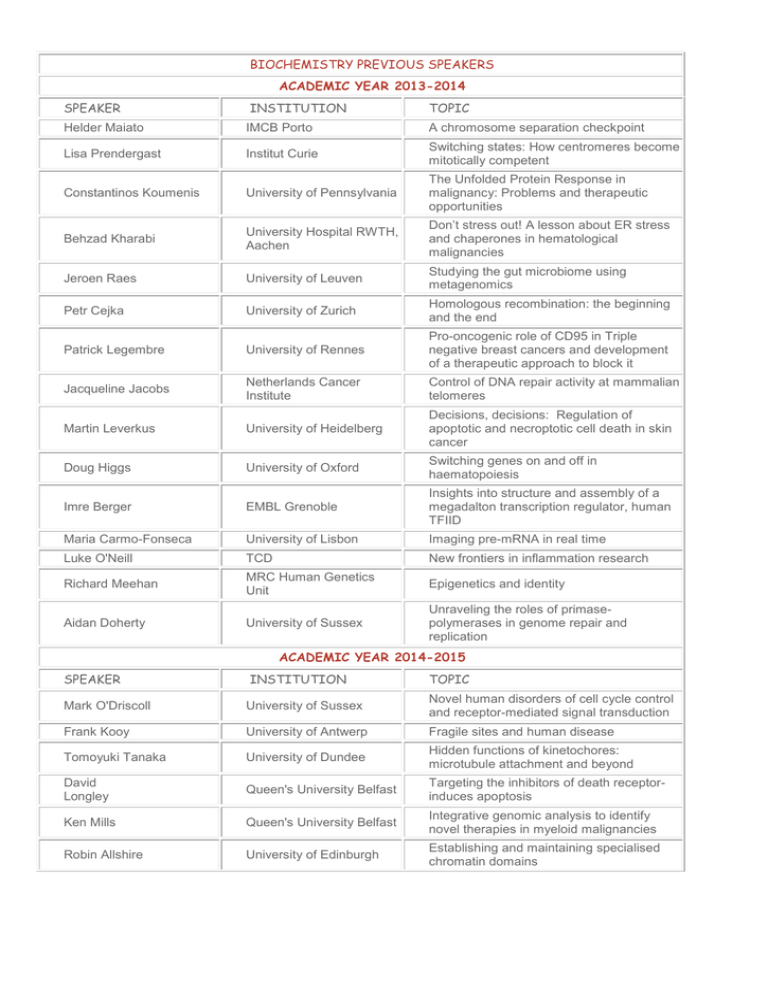
BIOCHEMISTRY PREVIOUS SPEAKERS ACADEMIC YEAR 2013-2014 SPEAKER INSTITUTION TOPIC Helder Maiato IMCB Porto A chromosome separation checkpoint Lisa Prendergast Institut Curie Switching states: How centromeres become mitotically competent Constantinos Koumenis University of Pennsylvania The Unfolded Protein Response in malignancy: Problems and therapeutic opportunities Behzad Kharabi University Hospital RWTH, Aachen Don’t stress out! A lesson about ER stress and chaperones in hematological malignancies Jeroen Raes University of Leuven Studying the gut microbiome using metagenomics Petr Cejka University of Zurich Homologous recombination: the beginning and the end Patrick Legembre University of Rennes Pro-oncogenic role of CD95 in Triple negative breast cancers and development of a therapeutic approach to block it Jacqueline Jacobs Netherlands Cancer Institute Control of DNA repair activity at mammalian telomeres Martin Leverkus University of Heidelberg Decisions, decisions: Regulation of apoptotic and necroptotic cell death in skin cancer Doug Higgs University of Oxford Switching genes on and off in haematopoiesis Imre Berger EMBL Grenoble Insights into structure and assembly of a megadalton transcription regulator, human TFIID Maria Carmo-Fonseca University of Lisbon Imaging pre-mRNA in real time Luke O'Neill TCD New frontiers in inflammation research Richard Meehan MRC Human Genetics Unit Epigenetics and identity Aidan Doherty University of Sussex Unraveling the roles of primasepolymerases in genome repair and replication ACADEMIC YEAR 2014-2015 SPEAKER INSTITUTION TOPIC Mark O'Driscoll University of Sussex Novel human disorders of cell cycle control and receptor-mediated signal transduction Frank Kooy University of Antwerp Fragile sites and human disease Tomoyuki Tanaka University of Dundee Hidden functions of kinetochores: microtubule attachment and beyond David Longley Queen's University Belfast Targeting the inhibitors of death receptorinduces apoptosis Ken Mills Queen's University Belfast Integrative genomic analysis to identify novel therapies in myeloid malignancies Robin Allshire University of Edinburgh Establishing and maintaining specialised chromatin domains Cathal Mahon University of California HIV host interactions - from systems to mechanisms Seamus Martin Trinity College Dublin Cell death and inflammation: the how and the why Sara Buonomo EMBL Monterotondo Relations between tri-dimensional nuclear organization and DNA replication timing Guy Poirier Laval University Quebec Identification of poly(ADP-ribosyl)ated proteins complexes during DNA damage signalling: Identification of potential biomarkers Fabrizio d’Adda di Fagagna IFOM - FIRC Institute of Molecular Oncology, Milan Molecular mechanisms of cellular senescence and a novel role of RNA in DNA damage response activation Ivan Dikic Goethe University Frankfurt Ubiquitin networks in regulation of inflammation and autophagy Phil Barker University of Montreal The p75NTR Neurotrophin Receptor: Jack of All Trades, Master of One or Two Simon Boulton CRUK London Research Institute Genome stability and the control of recombination Ken Wolfe University College Dublin Evolutionary rearrangement of yeast chromosomes Edel Maria Harvey Dublin City University The role of histone post-translational modifications in eukaryotic evolution Kristian Helin University of Copenhagen Epigenetic regulation of transcription and cell identity Anja Groth University of Copenhagen Chromatin replication and epigenome maintenance Lars Jansen Gulbenkian Institute, Oeiras Chromatin inheritance at the centromere and beyond David Ron University of Cambridge Protein folding homeostasis in the endoplasmic reticulum Eric Bullinger University of Magdeburg Understanding Biological Systems via Dynamical Modelling & Signal Analysis Gary Gorbsky Oklahoma Medical Research Foundation Navigating the metaphase-anaphase transition in mitosis John Greally Albert Einstein College of Medicine, New York. Regulatory elements in the metaepigenome Ross Chapman University of Oxford Molecular mechanisms governing programmed and unscheduled genomic rearrangements Nick Kent Cardiff University Sequencing chromatin architectures Mark Petronczki CRUK London Research Institute Control of cytokinesis and the dark side of the force ACADEMIC YEAR 2012-2013 SPEAKER INSTITUTION TOPIC Almer Van der Sloot University of Montreal Structure-based design of novel antitumour agents Michael Lisby University of Copenhagen Checkpoint sensing of DNA bridges in anaphase IFOM Milan Mechanisms coordinating chromosome replication and transcription Remy Pedeux Université de Rennes 1 The tumor suppressive protein ING2 is required for DNA damage response protein recruitment and promotes NHEJ Olaf Stemmann University of Bayreuth How separase, cohesin and shugoshin choreograph the chromosome-ballet of mitosis Simon Cook Babraham Institute That which does not kill me makes me stronger; acquired resistance to ERK1/2 pathway inhibitors in tumour cells. Lorenza Penengo University of Piemonte Orientale Ubiquitination and chromatin remodelling:How the ubiquitin ligase RNF168 drives the DNA damage response Iain Nicholl University of Wolverhampton Asprin, Inflammation, DNA repair and Colorectal Cancer Ram Reshef Haifa University Interplay Between Activin and Hox Genes Determines the Fate of Kidney Progenitor Cells and the Formation of the Kidney morphogenetic Field Gaëlle Legube CNRS Toulouse Transcription channels DNA doublestrand breaks to RAD51-dependent repair Ian Hickson University of Copenhagen Genomic instability and cancer: lessons from analysis of Bloom's syndrome Adrian Bracken TCD Epigenetic 'reader' proteins in stem cells and cancer Emmeline Hill UCD The genetics of exercise adaptation in Thoroughbred racehorses Peter Becker LMU Munich Chromosome-wide gene regulation: Lessons learned from Dosage Compensation in Drosophila Grant Stewart University of Birmingham Ubiquitin-dependent regulation of the DNA damage response induced by replication stress Karen Cawley Supervisor Afshin Samali of NUIG MicroRNAs: important modulators of ER stress-induced cell death Simonetta Piatti CRBM Montpellier Regulation of septins for cytokinesis and for coupling spindle positioning to mitotic exit Eric Chevet Université Bordeaux Segalen Endoplasmic Reticulum stress signaling in liver cancer: the AAA+ connection Jeremy Simpson UCD Genome-wide automated imaging of membrane traffic pathways in mammalian Marco Foiani cells Cynthia McMurray Lawrence Berkeley Laboratory Genetics and pathophysiology of Huntington's disease Domenico Delia Fondazione IRCCS Istituto Nazionale Tumori Functionality and DNA damage response of neurons generated from Ataxiatelangiectasia-derived induced pluripotent stem cells (iPS cells) René Medema The Netherlands Cancer Institute DNA damage-induced (ir)reversible cell cycle arrests in G1 and G2
